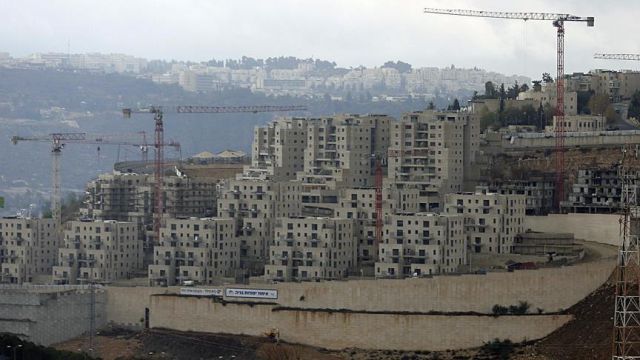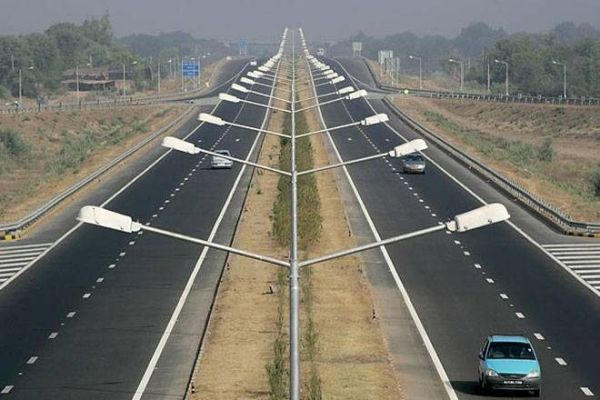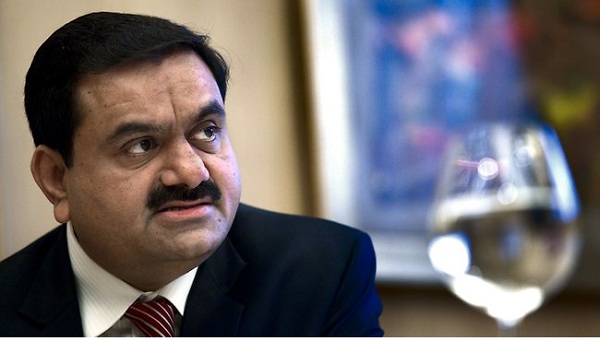
by admin | May 25, 2021 | Muslim World

Constructions of the Israeli settlement Ramot continue over the Palestinian lands in Jerusalem, on November 22, 2017.
Jerusalem: The Israeli authorities on Thursday approved the construction of hundreds of new Jewish-only housing units in occupied East Jerusalem, according to Israeli media reports.
“The [Israeli] Jerusalem Municipality’s planning and construction committee has approved the construction of 3,000 new housing units at the Gilo [settlement] in southern Jerusalem,” Israeli radio reported.
“The planned settlement units will be built on an area of approximately 280 dunams [around 252 square km], most of which is owned by Palestinians,” it added.
“This is a historic day for the city of Jerusalem,” Meir Turjeman, chairman of the municipal planning committee, was quoted as saying by the broadcaster.
“We approved the construction of thousands of new housing units in the Gilo settlement with a view to encouraging more young [Jewish Israeli] couples to come to Jerusalem,” Turjeman said.
“We are committed to building wherever possible in order to increase Jerusalem’s Jewish majority,” he added.
Last year, Israel’s Channel 10 reported on plans to build 300,000 new Jerusalem housing units as part of a so-called “Greater Jerusalem” bill aimed at annexing settlements built in the occupied West Bank.
According to Channel 10, most of the units would be constructed in areas located beyond the Green Line, in reference to territories that Israel occupied during the 1967 Arab-Israeli war.
Roughly 600,000 Israeli settlers currently live on more than 100 Jewish-only settlements built in the West Bank and East Jerusalem since 1967.
The Palestinians want these areas, along with the Gaza Strip, for the establishment of a future Palestinian state.
International law views the West Bank and East Jerusalem as “occupied territories” and considers all Jewish settlement-building activity on the land as illegal.
—AA

by admin | May 25, 2021 | News, Politics
 New Delhi : The Narendra Modi government on Tuesday approved an ambitious road construction and expansion programme of over 83,000 km over the next five years with an investment of about Rs 7 lakh crore.
New Delhi : The Narendra Modi government on Tuesday approved an ambitious road construction and expansion programme of over 83,000 km over the next five years with an investment of about Rs 7 lakh crore.
The aim is to improve infrastructure, entail faster transportation and generate employment.
Briefing reporters after a cabinet meeting, Finance Secretary Ashok Lavasa said the road building projects will generate 14.2 crore man-days of jobs.
The massive road building programme includes 34,800 km of BharatMala project to be constructed with an investment of Rs 5,35,000 crore.
“The historic road building programme for progress and prosperity involves building 83,677 km of roads at an investment of Rs 6.92 lakh crore,” Lavasa said.
Finance Minister Arun Jaitley, who also addressed the media, later tweeted that the huge public investment in road construction will generate employment.
There is a need to increase public investment and Rs 7 lakh crore for road expansion will generate employment opportunities, Jaitley tweeted.
The government has consistently battled accusations from the Congress and other opposition parties that the growth under the Modi government has been “jobless”.
Lavasa, who made a detailed presentation, said BharatMala includes economic corridors, border roads, coastal roads and greenfield expressways.
He said there will be 9,000 km of economic corridors, inter-corridor and feeder routes (6,000 km), national corridors efficiency improvement (5,000 km), border roads and international connectivity (2,000 km), coastal roads and port connectivity (2,000 km), Greenfield expressways (800 km) and balance national highway development works (10,000 km).
The BharatMala project will be funded by obtaining Rs 2.09 lakh crore from the market, private investment of Rs 1.06 lakh crore and Rs 2.19 lakh crore from central road fund, toll-operate-transfer model and from toll.
The remaining 48,877 km roads under other schemes with an outlay of Rs 1.57 lakh crore will also be undertaken in parallel by the National Highways Authority of India (NHAI) and the Ministry of Road Transport and Highways with 0.97 lakh crore from the central road fund and 0.59 lakh crore from budgetary support.
Lavasa said monetisation of 82 operating highways with an investment potential of Rs 34,000 crore has been taken up.
The bid for the first bundle of nine highway stretches of 680.64 km has been made with a monetisation value of Rs 6,258 crore, he added.
The road projects are aimed not only at improving connectivity but faster movement of trucks on highways for speedier transportation of goods and bringing down logistical costs.
Lavasa said India’s trade with its eastern neighbours will improve due to improvement in road infrastructure till border points.
He said India’s mercantile trade with Bhutan, Bangladesh and Nepal was $12 billion and linking Bangladesh-Bhutan-India-Nepal motor vehicles agreement and India-Myanmar-Thailand trilateral highway will make India’s northeast region “a hub of East Asia trade”.
Lavasa said border connectivity will improve with development of 3,300 km of roads along the eastern and western borders.
The first phase of the programme will involve construction of 1,000 km of roads.
He said 2,100 km of coastal roads will be built to boost tourism and industrial development and 2,000 km for port connectivity.
“Connectivity to ports and road development will be in conjunction with the Sagarmala project and 2,000 km will be developed in the first phase.”
While 5,013 km of national highways were constructed in 2011-12 and expenditure incurred on road construction was Rs 35,186 crore, it had gone up to 8,231 km of national highways and Rs 82,091 crore of expenditure in 2016-17.
Referring to the Pradhan Mantri Gram Sadak Yojana, Lavasa said Rs 88,185 crore will be spent by the central and state governments over the next three years.
He said 1,09,302 km of rural roads will be laid to cover 34,434 habitations. In addition, 5,411 km of roads will be upgraded and new roads will be completed in three years in the districts affected by Left Wing Extremism.
—IANS

by admin | May 25, 2021 | Corporate, Corporate finance
 Thiruvananthapuram:(IANS) Adani Ports chief Gautam Adani on Monday morning called on top political leaders of Kerala, ahead of the signing of an agreement with the Kerala government for the construction of the Vizhinjam port.
Thiruvananthapuram:(IANS) Adani Ports chief Gautam Adani on Monday morning called on top political leaders of Kerala, ahead of the signing of an agreement with the Kerala government for the construction of the Vizhinjam port.
Adani, who arrived here along with a 10-member team, first called on Chief Minister Oommen Chandy and his cabinet colleagues.
“This was a pre-agreement meeting. We will go ahead with this project and talk to all those who have expressed concerns about the project. All concerns would be addressed,” Chandy said after the meeting.
“Funds for the project are not a concern,” state Finance Minister K.M. Mani said.
Adani then drove to the official residence of leader of the opposition, V.S. Achuthanandan, and remained with him for 20 minutes.
Achuthanandan is understood to have told Adani that even though he would not be present when the agreement is inked later in the evening, he was not against the port project.
Adani later held meetings with the state BJP leaders.
The Communist Party of India-Marxist (CPI-M) on Sunday termed the MoU a “rip-off”.
The Kerala government will ink an agreement on Monday evening with Adani Ports for the proposed Vizhinjam port, 25 years after the project was first mooted.
The central government too will participate in the project, to be completed in three phases at a cost of around Rs.7,525 crore.
Chief Minister Oommen Chandy and Adani Ports chief Gautam Adani would be present when the agreement is signed between state Ports Secretary James Varghese and Adani Vizhinjam Port Private Limited CEO Santhosh Kumar Mahapatra in the Durbar Hall of the state secretariat.
Though the first phase is expected to be ready in four years, Adani Ports officials told Chandy they would finish it in around two years.
Once completed, the port would enable ships with a capacity of even 18,000 TEU (20-feet equivalent units) to dock.
TEU is an inexact unit of cargo capacity often used to describe the capacity of container ships and container terminals.
The proposed port, located close to the busy international shipping route, is envisaged to handle 4.1 million containers annually.
Adani Ports was the lone bidder and sought Rs.1,635 crore as grant for the project. It would operate the port for 40 years, extendable by another 20 years. The state government would get a portion of the revenue from the port after 15 years of operations.
Prime Minister Narendra Modi is slated to lay the foundation stone of the project on November 1, Kerala’s formation day.




